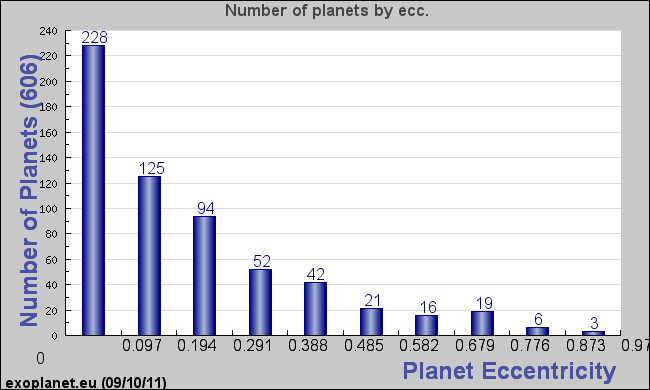NASA Science News | Dr. Tony Phillips | 2013 Aug 17
When the Space Age began, astronomers knew of exactly zero planets outside the solar system. What a difference 50 years makes.Click to play embedded YouTube video.
Modern, ground-based telescopes and NASA's Kepler spacecraft have now confirmed more than 850 exoplanets, while thousands more await confirmation. The pace of discovery suggests "there are at least 100 billion planets in our galaxy," says John Johnson of Caltech, who works with data from the Kepler mission. "That's mind-boggling."
When the hunt for exoplanets began, the focus was on Earth-like worlds, planets like our own that might support alien life in distant solar systems. Yet planets as small as Earth are difficult to detect when they circle stars hundreds of light years away. Indeed, only a handful have been found so far.
The real haul has been in gas giants, especially “hot Jupiters.” These are behemoth worlds that orbit close to their parent stars, blocking a fraction of the star’s light when it transits in front. Observations of hot Jupiter “mini-eclipses” have yielded hundreds of discoveries.
At first considered to be the "chaff" researchers would have to wade through to get to the fainter Earth-like worlds, hot Jupiters are now attracting their own attention.
Consider the case of "HD189733b," discovered in 2005 by a team working at the Haute-Provence Observatory in France. Because it is nearby, only 63 light years away, and because it blocks a whopping 3% of the light from its orange-dwarf parent star, astronomers are rapidly learning a great deal.
For one thing, it's blue. Data obtained by the Hubble Space Telescope suggest that, seen from a distance, the azure disk of HD 189733b would look to the human eye much like Earth. Indeed, some members of the media have taken to calling it "the other blue planet."
It is, however, anything but Earthlike.
In 2007, Heather Knutson of Caltech made a global temperature map of HD189733b using NASA’s infrared Spitzer Space Telescope. She knew it would be hot because HD189733b orbits its star 13 times closer than Mercury. “Even so, we were impressed by the readings,” she recalls. Temperatures ranged from 1200 F on the nightside to 1700 F on the dayside. Thermal gradients drive winds as fast as 6000 mph, carrying suffocating heat around the globe.
The blue color may be caused by silicate particles in the planet’s atmosphere, which scatter blue wavelengths of light from the parent star. The same physics plays out in Earth’s atmosphere, although the chemicals are different. Silicates are a component of glass, so some researchers have speculated that it is actually raining molten glass on HD189733b.
The newest observations come from a pair of X-ray observatories. NASA’s Chandra and the ESA’s XMM Newton watched HD189733b transit its star and detected a drop in X-rays three times deeper than the corresponding decrease in optical light. This means the outer atmosphere is larger than anyone expected.
In fact, it is probably boiling away. Authors of the study estimate HD189733b is losing 100 million to 600 million kilograms of mass per second.
"The extended atmosphere of this planet makes it a bigger target for high-energy radiation from its star, so more evaporation occurs," notes Scott Wolk of the Center for Astrophysics.
Blasts of stellar radiation hitting the planet at point-blank range could have another effect: auroras that wrap around the planet from pole to pole, orders of magnitude brighter than any Northern Lights in our own solar system. This is speculative, though.
While the search for Earth-like planets proceeds, hot Jupiters are a welcome albeit unexpected diversion. It makes you wonder, what will we be looking for 50 years from now…?
http://asterisk.apod.com/viewtopic.php?t=31831
